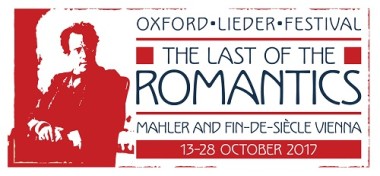
 United Kingdom Oxford Lieder Festival [5] – Mahler, Des Knaben Wunderhorn: Birgid Steinberger (soprano), Stephan Loges (bass-baritone), Sholto Kynoch (piano). St John the Evangelist Church, Oxford. 28.10.2017. (CR)
United Kingdom Oxford Lieder Festival [5] – Mahler, Des Knaben Wunderhorn: Birgid Steinberger (soprano), Stephan Loges (bass-baritone), Sholto Kynoch (piano). St John the Evangelist Church, Oxford. 28.10.2017. (CR)
To round off this year’s Oxford Lieder Festival, Birgid Steinberger and Stephan Loges came together for a genial account of Mahler’s Des Knaben Wunderhorn collection, playing off each other with affectionate humour, and generally providing an air of levity even in the more serious settings that concern the onset of war or conscription. The recital excluded those settings of Wunderhorn comprised in the earlier collections of songs published in 1892 as Lieder und Gesänge (later re-named as Lieder und Gesänge aus der Jugendzeit), but included the dozen originally gathered together in a collection of 1899, and a few other subsequent settings by Mahler from the large group of poems assembled by Achim von Arnim and Clemens Brentano at the beginning of the 19th century. The two ends of German Romanticism met together in these songs, therefore, providing the perfect conclusion to the Festival’s survey of Mahler’s Lieder and those of other composers at the end of the Romantic period.
Bridgid Steinberger’s contributions were generally radiant and pure, evoking something of the wonder and innocence of the boyish poet in whose voice the poetry is written, in such songs as ‘Wer hat das Liedlein Erdacht?’ and ‘Rheinlegendchen’. The quivering note of fear and tenseness which crept into her interpretations of ‘Das irdische Leben’ and ‘Es sungen drei Engel einen süssen Gesang’ underlined that guilelessness, whilst the knowing voice of experience was palpable in the soprano’s interjections to ‘Der Schildwache Nachtlied’ (‘Dear boy, you must not be sad, / I’ll wait for you / In the rose garden / In the green clover’) where the mysterious quality of tone and the interval of a falling seventh echoed Kundry’s similar musical gesture in Act II of Parsifal as she attempts to kiss the young hero in Wagner’s music drama. Only in ‘Das Himmlische Leben’ (re-used substantially as the final movement of the Fourth Symphony) did Steinberger’s almost shrill, cooing tone seem out of place, but she rightly attained a rarefied, enraptured quality for ‘Urlicht’ to end the cycle (which forms the basis, in its turn, of the penultimate movement of the ‘Resurrection’ Symphony).
Irony and humour were played out well by Steinberger and Stephan Loges in the songs scored for both a male and female singer, particularly in ‘Verlorne Müh’’ and ‘Trost im Unglück’ – for the former song (‘Wasted Effort’ in translation), Loges expressed a snarling, even howling contempt in his threefold rebuff to Steinberger’s amorous entreaties, and his impersonations of the adjudicating donkey for ‘Lob des hohen Verstandes’ was comic. In contrast the almost bellowed reference to the gallows in ‘Der Tamboursg’sell’ was appropriate, and his dark-toned, urgent account of ‘Revelge’ expressed effectively the horrors of war which the poem depicts, but elsewhere his singing had a variously grainy quality which worked against any lyrical or melodious tendencies on some occasions, such as in ‘Des Antonius von Padua Fischpredigt’.
Sholto Kynoch’s accompaniments were clear, aiding the lucidity of the performances, but providing many points of interest on their own account, be it the hard-toned, ominous rumblings low down in the bass register for ‘Revelge’, the flitting upper register on the instrument for the heavenly vision of ‘Das Himmlische Leben’, or the sparkling, witty support provided for ‘Rheinlegendchen’. In those songs better known from their symphonic versions it is difficult not to fill in the timbral gaps in one’s mind with the instruments that feature in their full scoring, but the sparser, original piano accompaniments offered their own insights into these settings which it was a pleasure to hear.
To dispel the renunciatory seriousness of the concluding ‘Urlicht’, the performers offered some enjoyable light-hearted fare in two encores – first, ‘Guten Abend’, No.4 from Brahms’s 49 German Folksongs WoO33, and then another, unidentified duet, possibly also by Brahms. They were a fitting addendum to the contrasting moods and situations covered in Des Knaben Wunderhorn, and to the ferment of wide-ranging ideas and forms of expression which composers were exploring in Vienna during the decades on either side of 1900 as this Festival had revealed.
Curtis Rogers
